Naushad Ali and Mohd. Rafi: A matchless permutation
Compiled by: Mr. Biman Baruah, resident of Lakhiminagar,Sivasgar, Assam.
 Naushad Ali and Mohammed Rafi both were the legends of Hindi Film Music, former one is one of the greatest Music Directors of Indian Cinema and later one is one of the greatest playback singers of Indian Cinema who made for each other and born on 25th and 24th December respectively.
Naushad Ali and Mohammed Rafi both were the legends of Hindi Film Music, former one is one of the greatest Music Directors of Indian Cinema and later one is one of the greatest playback singers of Indian Cinema who made for each other and born on 25th and 24th December respectively.
Naushad Ali was born on 25th December 1919 in Lukhnow, a traditional city famous for refined North Indian Culture. From early childhood in Lukhnow he was a keen listener to the live orchestras accompanying silent films. Before coming to Bombay, he used to repair harmoniums and composed for amateur theatricals such as the Windsor Music Entertainers.
Mohammed Rafi was born on 24th December 1924 at Kotla Sultanpur, a town near Amritsar in undivided Punjab. In childhood, he started singing by imitating chants of a Fakir in his village. He started his career at the age of 20, as singer in a Punjabi film Gul Baloch.
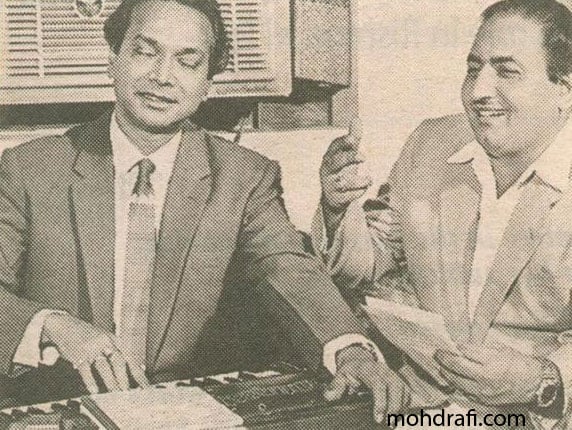
Lessons in Music:
Naushad studied classic Hindustani music under Ustad Ghurbat Ali, Ustad Yusuf Ali and Ustad Babban Seheb.
Rafi learnt Hindusthani Classsical music from Ustad Bade Ghulam Ali Khan, Ustad Wahid Ali Khan, Pandit Jiwanlal Matto and Firoze Nizami.
Initial Days in Bombay:
Naushad moved to Bombay in late 1930s to try his luck in Hindi Cinema as a musician. After struggle, he got a job as a pianist in composer Mushtaq Hussain’s orchestra. Then, he joined as an assistant to music director Khemchand Prakash. His first independent break as a composer in Prem Nagar (1940), but he was noticed with Sharda (1942) and then Rattan (1944) took him right to the top which enabled him to charge Rs. 25,000 a film. He composed hit music in the 1940s mainly in the films of A.R. Kardar’s Shahjehan(1946), Dard(1947), Dillagi(1949), Dulari(1949), and Mehboob Khan’s Anmol Ghadi(1946), Elaan(1947), Anokhi Ada(1948), Andaaz(1949). He was one of the first composers to introduce sound mixing and the separate recording of voice and music tracks in playback singing. He combined first the flute and the clarinet, the sitar and mandolin. He also introduced the accordion to Hindi film music and was among the first to concentrate on background music to make perfection in characters’ moods and dialogues delivery through music.
Rafi moved to Bombay in 1944 and Tanvir Naqvi introduced him to leading film producers like A.R.Kardar, Mehboob Khan and actor-director Nazeer. He met the famous music director Naushad with a letter of recommendation from Naushad’s father. Initially, Naushad used Rafi as part of a chorus in the song “Hindustan Ke Hum Hain Hindustan Hamara Hindu-Muslim Dono Ki Aakhoon Ka Tara” with Shyam Sundar, Alauddin and others from A.R.Kardar’s Pehle Aap(1944) for which Rafi got only 50 rupees. Rafi sang a number of songs for Naushad as part of chorus, including the famous one “Mere Sapnon Ki Rani Roohi Roohi” with his idol K.L. Saigal from the film Shahjahan(1946). Rafi was first noted for the song “Tera Khilona Toota Balak” from Mehboob Khan’s Anmol Ghadi (1946) and his duet “Yahan Badla Wafa Ka” with Noor Jehan in the film Jugnu also became a hit. In 1949, Rafi was given solo songs by Naushad in the films Chandni Raat, Dillagi and Dulari.
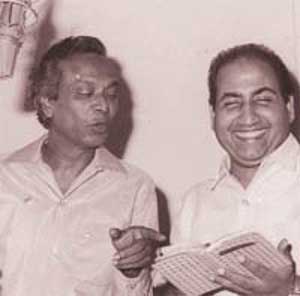
In 1952, the songs of Baiju Bawra established Rafi as the number one playback singer of Hindi Cinema. It is said that Talat Mahmood was the Naushad’s favorite singer and once he found Talat smoking in recording room, so he irritated and hired Rafi to sing for Baiju Bawra. Later on Naushad started using Rafi as a male voice in almost every song composed by him. In fact, Nuashad Saheb found a singer in Rafi Saheb, who was capable of singing all type of songs of his compositions perfectly.
Naushad-Rafi and tragic hero Bharat Bhushan:
Naushad Ali was best known for version of Indian traditional classical music into the Hindi Film Music. Almost his compositions were inspired by traditional raga modes. Baiju Bawra is a good example of Naushad’s clutch of classical music. Dilip Kumar and Nargis was the original choice of veteran filmmaker Vijay Bhatt for this grand project, but composer Naushad cut off star names and insisted on comparative newcomers. The all songs of the film “O Duniya Ke Rakhwale Sun Dard Bhare Mere Nale“, “Tu Ganga Ke Mauj Mein Jamuna Ki Dhara Ho Rehega Milan Ye Hamara Tuhmara“, “Man Tarpat Hari Darshan Ko Aaj“, “Nirdhan Ka Dhan Lutnewale Lut Loo Dil Ka Pyar“, “Mohe Bhool Gaye Sawariya“, “Akeli Mat Jaiyo Raadhe Jamuna Ke Teer“, “Jhoole Mein Pawan Ki Aayi Bahar“, “Door Ki Gaae Dhun Ye Sunaae“, “Bachpan Ki Mohabbat Ko Dil Se Na Juda Karna“, “Insaan Bano Karlo Bhalai Ka Koi Kaam” was became very popular and out of which first two are everlasting. The film was a golden jubilee hit with much help from Naushad’s classical raga based compositions and vocals of Rafi and it established two new stars Bharat Bhushan & Meena Kumari.
When the film celebrated its silver jubilee at the Broadway Theatre in Bombay, Naushad Saheb told producer Vijay Bhatt, “I used to sleep on the pavement opposite the theatre when I first came to Bombay. It took me 16 years to cross the road and get here”.
In the words of India’s greatest playback singer Lata Mangeshkar who sang for Naushad in Baiju Bawara, “The music he composed for Baiju Bawara surprised even me. It was entirely different from what he had done before. Different ragas were used for different situations and the purity of the ragas was maintained to the greatest possible extent.” Naushad was among the early composer who gave Lata a break to sing and the films Andaaz and Dulari were influential in her rise to the top in 1949.
The other impressive Rafi songs composed by other than Naushad were “Ek Pardesi Mera Dil Le Gaya” from Phagun, Do Ghadi Woh Jo Paas Aa Baithe” from Ghunghat, “Zindagi Bhar Nahin Bhulgi” from Barsaat Ki Raat and “Jab Jab Bahar Aaye Aur Phool Muskurayee” from Taqdeer picturised on Bharat Bhushan with perfect lip harmonization.
Naushad-Rafi-Sakeel Badayuni and tragedy king Dilip Kumar:
In late 1950s, Rafi’s voice, Naushad’s music and Shakeel Badayuni’s lyrics would become super-duper hit and the songs were being heard in all corners of the streets. The combination is famous for extraordinary songs picturised on Dilip Kumar, the greatest actor whose performances are renowned as the epitome of Indian Cinema. He earned the title of “tragedy king” for playing tragic roles in the films Babul (1950), Deedar (1951), Amar (1954), and Devdas(1955). The Naushad’s music and Rafi’s voice had much facilitate the thespian Dilip Kumar in getting this title.
Naushad composed the music for Dilip Kumar starred films like Mela(1948), Andaz(1949), Babul(1950), Deedar(1951), Aan(1952), Amar (1954), Uran Khatola (1955), Kohinoor (1960), Mughal-E-Azam(1960), Gunga Jamuna(1961), Leader(1964), Dil Diya Dard Liya (1966), Ram Aur Shyam (1967), Sungharsh(1968) and Aadmi(1968). Naushad had used the voice of Mukesh in Mela and Andaz and Talat Mehmood in Babul to playback for Dilip Kumar.
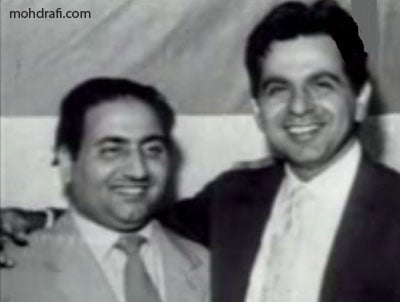
Naushad had used the voice of Rafi to playback for Dilip Kumar first time in Deedar and all the songs were everlasting: “Hue Hum Jinke Liye Barbaad Sahe Woh Humko Kare Na Yaad Jeevan Bhar Hum Unke Yaad Mein Gaye Jayenge“, “Meri Kahani Bhulne Wale Tera Jaha Abad Rahe“, “Bachpan Ke Din Bhula Na Dena“, “Naseeb Dar Pe Tere Aazmaane Aaye Hoon” by Rafi and “Dekh Liya Meine Kismat Ka Tamasha Dekh Liya” by Rafi-Lata. Mehboob Khan’s Aan had two evergreen Rafi songs: “Maan Mera Ehsaan Aare Nadan Ki Meine Tujshe Kiya Hai Pyar” and “Dil Mein Chupa Ke Pyar Ka Toofan Le Chale“. The songs of Udan Khatola “O Door Ke Musafir Humko Bhi Saath Le Le Re“, “Mohabbat Ki Rahoo Mein Chalna Sambhal Ke Yahan Joo Bhi Aaya Gaya Haath Maal Ke“, “Sambhal Kar Khelna Dariya Se Moojee Ki Ravani Mein“, “Mera Salam Le Ja“, “Haal-E-Dil Main Kya Kahoon” were very expressive.
The songs of Kohinoor “Do Sitaron Ka Zameen Par Hai Milan“, “Madhuban Mein Radhika Nache Girdhar Ki Murliya Baaze Re“, “Dhal Saki Syame-Gam Muskurra Le Sanam“, “Chalenge Teer Jab Di Par” were so outstanding with special effects of bhajans.
Naushad Saheb was also famous for using of eminent classical artistes in his films and Mughal-e-Azam is a very good example of it, where two songs “Shubh Din Aayo” and “Prem Jogan Ban Ke Sundari Pio Chali” were sung by noted classical singer Bade Ghulam Ali Khan. In spite of exceptional musical score in the film with Rafi’s “Ae Mohabbat Zindabad” with chorus of 100 and everlasting Lata jewels “Pyar Ki To Darna Kiya” and “Mohabbat Ki Jhooti Kahani Pe Roye“, it was surprising that Naushad Saheb lost the Filmfare Award that year which goes to Shankar-Jaikishan for popular melody in Dil Apna Aur Preet Parayi (1960).
In 1961 Dilip Kumar’s home production starred with his real life brother Nasir Khan in Gunga Jamuna had exciting Rafi number “Nain Lad Jayeehen Tu Maan Rama Khatak Hoibe Kori Prem Ka Nagari Mein Hum Ka Bhi Hauqe Hoibe Kari” with bhojpuri mixture even picturised on Dilip Kumar. Another Rafi-Lata duet from the film was “Chhalia Re Chhalia“. Leader had classic Rafi songs with romantic plea: “Mujhe Duniyawalo Sharabi Na Samjo Mein Pita Nahin Hoon Pilayee Gayee Hai“, “Humi Se Mohabbat Humi Se Laddai Aare Mar Dala Duhayee Duhayee“, “Teri Husn Ki Kiya Tariff Karun“, “Ek Shahenshah Ne Banke Hasin Tajmahal” and “Apni Azadi Ko Hum Hargiz Mita Sakte Nahin” by Rafi-Lata. All the Rafi songs from Dil Diya Dard Liya : “Dilruba Meine Tere Pyar Mein Kiya Kiya Na Kiya Dil Diya Dard Liya” “Koi Sagar Dil Ko Bahlata Nahin“, “Gujre He Isqe Mein Hum Us Mukam Se Nafrat Si Ho Gayi He Mohabbat Ki Naam Se“, “Sawan Aye Na Aye” were one of the bests which harmonized with Naushad’s compositions.
After a number of box office flops in mid 1960s, Dilip Kumar comeback in double role with full of comedy, action, dance and all nitty-gritty in Ram Aur Shyam (1967) that was a biggest box office hit. But Naushad’s compositions with Rafi songs overruled all nitty-gritty of the film. The remarkable songs were “Aaj Ki Raat Mere Dil Ki Salami Le Le“, “Aayee Hai Baharen Mite Zulm-Sitam Pyar Ka Zamana Aaya Door Huye Gaam” by Rafi, “Main Hoon Saqi Tu Hai Sharabi Sharabi” by Rafi-Lata was picturised on Dilip Kumar and Waheeda Rehman and “Lut Liya Dil Tune Mera Raah Mein Chalte Chalte” by Rafi-Asha was picturised on Dilip Kumar and Mumtaz.
Dilip Kumar-Vyjayanthimala starred Sangharsh had two popular Rafi songs composed by Naushad Saheb : ” Mere Peron Main Ghungroo Bandha De Tu Phir Meri Chal Dekh Le” and “Jaab Dil Se Dil Takrata Hai Maat Poocheyee Kiya Hota Hai Rukti Hain Zuban Jukti Hai Nazaar Mathe Pe Pachina Aata Hai“. Both the songs are very good example of versatility of composition and singing of two legends. The first song creates hullabaloo among the audiences in the Cinema Hall and the second one creates motionlessness. Dilip Kumar-Waheeda Rahman-Manoj Kumar starred AADMI was the last film of this combination and the film had two emotional and precious songs: “Aaj Purani Rahano Se Koi Mujhe Aawaz Na De” and “Na Aadmi Ka Koi Bharosa Na Dosti Ka Koi Thikana“.
Naushad Saheb used to compose music for most of the thespian’s film suffered his profession due to decline of Dilip Kumar in late 1960s. He completed music of PAKEEZAH after death of Ghulam Mohammed and continued doing occasional film up to 1990s without old magic due to popularity of westernized music. Rafi Saheb continued doing playback for Dilip Kumar in films like Gopi (1970), Daastan (1972), Bairaag (1976) and Kranti (1981).
Naushad-Rafi and Jubilee hero Rajendra Kumar:
In 1960s, Raf-Shankar-Jaikishan combination was famous for songs picturised on jubilee hero Rajendra Kumar in beautiful and natural locations of Kashmir and Himachal. Rafi Saheb was the natural voice of Rajendra Kumar and catch of Rafi songs supported to a great extent making Kumar’s six consecutive films hits between 1963 to 1966: Mere Mehboob(1963), Sangam(1964), Ayee Milan Ki Bela(1964), Zindegi(1964), Arzoo(1965) and Suraj(1966), which felicitated him the label of “Jubilee Hero”.

Naushad Saheb also composed music for Rajendra Kumar starred films like: Mere Mehboob (1963), Palki(1967), Saathi(1968), Ganwaar(1970), Tengewala(1972) and Sunehra Sansar(1975), out of which Mere Mehboob and Ganwaar were box office hits. H.S. Rawail’s Mere Mehboob, a triangular romantic and muslim social drama had popular Rafi songs: “Ai Husn Zara Jaag Tujhe Isqe Jagati Hai“, “Mere Mehboob Tujhe Meri Mohabbat Ki Kasam Phir Mujhe Nargisi Aakhon Ka Sahara De De“, “Tumse Izhaar-e-Haal Kar Baithe“, “Aaj Purkat Ka Khwab Tut Gaya“, “Yaad Mein Teri Jag-Jag Ke Hum Raat Bhar Karwate Badalte Hai” in ghazal forms. Mahesh Kaul’s Palki had also similar Rafi ghazals like “Aye Shehr-e-Lakhnoo Tujhe Mera Salaam Hai“, “Dil-e-Betaab Ko Seene Se Lagaana Hoga“, “Mere Ghar Se Pyaar Ki Palki Chali Gayee“, “Kaal Raat Zindegi Se Mulakat Ho Gaye Lab Tharthara Rahe The Magar Baat Ho Gaye“, “Bhari Mehfil Mein Agar Mere Maula Ek Tera Sahara Mil Jaaye“.
Mukesh and Lata sang the memorable song from Sridhar’s Saathi “Mera Pyar Bhi Tu Hai Ai Bahar Bhi Tu Hai Tuhi Nazroon Mein Jane Tamanna” picturised on Rajendra Kumar and Vyjayanthimala. Naushad used the voice of Mukesh for Jubilee Kumar in the above duet in Saathi on pressure from the side of producer and again in Sunehra Sansar duet “Bheegi Bheegi Hawa Hai, Kali Kali Ghata Hai” picturised on Rajendra Kumar & Hema Malini under similar circumstances.
Rajendra Kumar’s home production with his real life brother Naresh Kumar in director’s seat had number of popular and memorable songs: “Duniya Hanse Hanste Rahe Main Hoon Ganwaar Mujhe Saab Se He Pyar“, “Mehka Mehka Roop Tuhmara Beheki Beheki Chal Main Pholoon Ki Daal Girahi Pooche Ek Sawal Tuhmara Naam Kya Hai” and the sharabi number “Peekar Sharab Khelunga Main Tu Sabab Se Bathe Hai Mere Samne Chehere Gulab Se” by Rafi, “Hum Se To Achhi Teri Payal Gori Jo Rooj Rooj Tera Badan Sumee” and “Tera Chikna Roop Hai Aaicha Anar Jaisa Kajra Laal Sajini” by Rafi-Asha. Mahendra Kapoor sang another song from the film “Woh Kaun Hai Jo Maaki Tarah Booj Uthayee Palkoo Mein Bethayee, Yehi Dharti Yehi Dharti“. Ganwaar was the last box office success of Rajendra Kumar and also the last film of Vyjayanthimala who paired with him in six films.
Naushad-Rafi-and superstar Rajesh Khanna :-
Naushad used the voice of Rafi to playback for Rajesh Khanna in Sultan Ahmed’s multicast film DHARAM KANTA (1981) starring Raaj Kumar, Waheeda Rahman, Rajesh Khanna, Reena Roy, Jeetendra, Sulachana Pandit and Amjad Khan in dual role. The songs from the film: “Yeh Gotey Dar Lahenga Nikele Jaab Chaal Se” by Rafi-Asha was picturised on Rajesh Khanna & Reena Roy in a train and “Duniya Chhoote Yaar Na Chhote Dil Ki Dharam Kante Par Dekha Pyar Ka Palla Bhari Hai” by Mohd. Rafi & Bhupinder was picturised on Rajesh Khanna & Jeetendra riding horse. Another Rafi-Asha duet from the film “Tera Naam Liya Dil Tham Liya” was picturised on Jeetendra & Sulachana Pandit. The lyric of the songs was penned all time favourite lyricist Majrooh Sultanpuri. It was the last notable film of composer Naushad and Naushad-Rafi matchless combination which was started with film the Pehle Aap (1944).
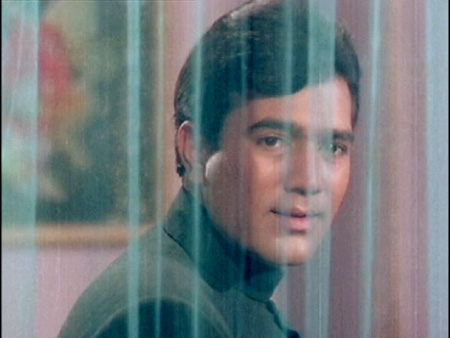
Music Career:
Naushad Saheb was one of the top music directors of Hindi Cinema from 1942 until the late 1960s and composed music for 68 Hindi films. Rafi Saheb was the top playback singer of Hindi Cinema from 1948 to 1980 and had sung over 26,000 songs in 11 Indian languages from 1944 to 1980. Rafi Saheb sang a total of 149 songs for Naushad in 41 films.
Additional Assignments:
Naushad Saheb had produced the films: Babul (1950), Uran Khatola (1955) and Malik (1958) and he had also written the story of the film Palki (1967). He also composed the music for all these films. Rafi Saheb forcefully acted in films like Laila-Majnu, Jugnu and Samaj Ko Badal Daloo in small roles. He was hit paired with Lata Mangeshkar as a playback singer.
Award and Recognitions:
In 1952, Naushad received the Filmfare Award for the Best Music Director. He was awarded the Dadasaheb Phalke Award in 1981 for his lifetime contribution to Indian Cinema. He also got the Sangeet Natak Akademi Award in 1992. Naushad was a guest of honor at the premiere, when a colorized version of K. Asif ‘s historical classic Mughal-E-Azam was released in 2004.
In 1948, Rafi received a silver medal from the Indian Prime Minister Jawaharlal Nehru, on the first anniversary of the Indian Independence Day. In 1965, the Government of India with the Padmashri Award honoured him. He also won the National Film Award two times and Filmfare Award six times for Best Male Playback Singer.
Last works:
The last film that Naushad Saheb composed music for was director Akbar Khan’s Taj Mahal: An Eternal Love Story, which was released in 2005. He passed away on May 5, 2006 in Mumbai due to cardiac arrest.
On Thursday, July 31,1980, Laxmikant-Pyarelal recorded Rafi’s last song “Shaam Phir Kyun Udaas Hai Dost, Tu Kahi Aas Paas Hai Dost” for Dharmendra-Hema Malini starred film Aas Paas. After recording of the song, Rafi asked L-P if he could leave for home and L-P were shocked because Rafi would be the last person to leave for home. On the same day, Rafi Saheb died at 10.50 p.m. due to massive heart attack.
In the golden days of HFM, Naushad Saheb used to study each and every portion of his tunes meticulously, if he were not satisfied with even one word, he would ask the lyricist to write the whole line. Usually he takes a fortnight to compose a single song and often could compose music for just two films a year. In his words, “In my 65 years in the film industry, I composed music for 68 films. These days you come across people who have done the music 200 films in two years. What I’m saying is that, we used to agonise over every tune and phrase in music, spend sleepless nights over a song, and work on it until it was perfected. And I am still looking for perfection.”
After Independence in 1947, due to partition of India and Pakistan it was very critical for Hindi Film Music because of the people moved to Pakistan and decided to stay in India. Both Naushad and Rafi decided to stay in India and created a treasure in later days for Hindi Film Music, otherwise the heart of it would have been lost and there would not have been Baiju Bawra(1952) or Mughal-E- Azam(1960). Now both the legends are not amongst us, but the marvelous compositions and vocals of them will never die away from this Earth and will be Immortal as a major force in Hindi Cinema and Music world.
A list of jewels of Naushad-Rafi immortal permutation: –
| Year | Film |
Song
|
Lyrics | Actor |
| 1948 | Mela | Yeh Zindagi Ke Mele Duniya Mein Kam Na Honge Afsoos Hum Na Honge | Shakeel Badayuni | Unknown Actor |
| 1952 | Baiju Bawra | O Duniya Ke Rakhwale Sun Dard Bhare Mere Nale | Shakeel Badayuni | Bharat Bhushan |
| 1952 | Baiju Bawra | Tu Ganga Ke Mauj Mein Jamuna Ki Dhara Ho Rehega Milan Ye Hamara Tuhmara | Shakeel Badayuni | Bharat Bhushan |
| 1952 | Deewana | Tasveer Banata Hoon Teri Khoone Jigar Se | Shakeel Badayuni | Suresh Kumar |
| 1951 | Deedar | Meri Kahani Bhulnewale Tera Jaha Abad Rahe | Shakeel Badayuni | Dilip Kumar |
| 1952 | Aan | Maan Mera Ehsaan Aare Nadan Ki Meine Tujshe Kiya Hai Pyar | Shakeel Badayuni | Dilip Kumar |
| 1955 | Udan Khatola | O Door Ke Musafir Humko Bhi Saath Le Le Re | Shakeel Badayuni | Dilip Kumar |
| 1960 | Kohinoor | Madhubaan Mein Radhika Nache Girdhar Ki Murliya Baaze Re | Shakeel Badayuni | Dilip Kumar |
| 1961 | Gunga Jumna | Nain Lad Jayeehen Maan Rama Khatak Hoibe Kari | Shakeel Badayuni | Dilip Kumar |
| 1964 | Leader | Mujhe Duniyawalo Sharabi Na Samjho | Shakeel Badayuni | Dilip Kumar |
| 1966 | Dil Diya Dard Liya | Gujre He Aaj Isqe Mein Hum Us Mukam Se | Shakeel Badayuni | Dilip Kumar |
| 1967 | Ram Aur Shyam | Aaj Ki Raat Mere Dil Ki Salami Le Le | Shakeel Badayuni | Dilip Kumar |
| 1968 | Sungharsh | Mere Peron Main Ghungroo Bandha De Tu Phir Meri Chal Dekh Le | Shakeel Badayuni | Dilip Kumar |
| 1968 | Aadmi | Aaj Purani Rahoo Se Koiyee Mujhe Aawaz Na De | Shakeel Badayuni | Dilip Kumar |
| 1960 | Mughal-E-Azam | Ae Mohabbat Zindabad | Shakeel Badayuni | Unknown Actor |
| 1963 | Mere Mehboob | Mere Mehboob Tujhe Meri Mohabbat Ki Kasam | Shakeel Badayuni | Rajendra Kumar |
| 1963 | Mere Mehboob | Ai Husn Zara Jaag Tujhe Isqe Jagati Hai | Shakeel Badayuni | Rajendra Kumar |
| 1967 | Palki | Kaal Raat Zindegi Se Mulakat Ho Gaye | Shakeel Badayuni | Rajendra Kumar |
| 1970 | Ganwaar | Main Hoon Ganwaar Mujhe Saab Se He Pyar | Rajendra Krishna | Rajendra Kumar |
| 1970 | Ganwaar | Mehka Mehka Roop Tuhmara Beheki Beheki Chal | Rajendra Krishna | Rajendra Kumar |
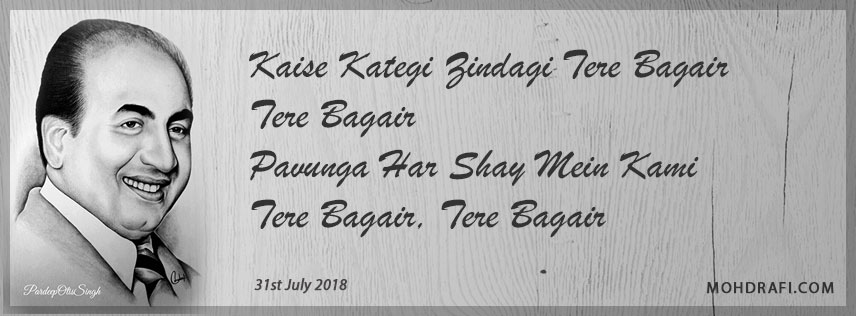














Pohi kkhoob bhaal lagil
Amin sayani is the part of bad media who tried to ignore Mohd Rafi but who can ignore the God gift…..
my email reply he said that he is Kishore da fan but also he like Mohd rafi and he did many programs with mohd Rafi my Question was why u ignore mohd rafi name when u was speaking about Tesri manzil music but u didn’t igore Kishore da name when you speak about music where kishore da sang!!!!!!!!!!!